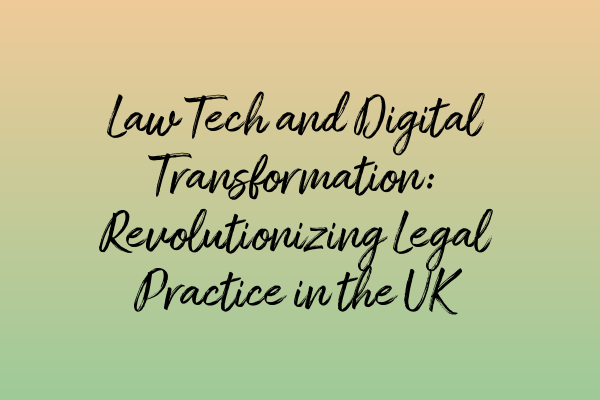
Law Tech and Digital Transformation: Revolutionizing Legal Practice in the UK
Technology has undoubtedly revolutionized various sectors and industries around the world. The legal profession is no exception to this digital transformation. The emergence of law tech has significantly impacted the way legal professionals practice law in the United Kingdom. This article will explore the role of technology in revolutionizing legal practice and its impact on the legal industry in the UK.
The Rise of Law Tech
Law tech refers to the use of technology and digital tools to streamline legal processes, enhance efficiency, and improve access to justice. Over the years, law tech has gained momentum, transforming traditional legal practices and paving the way for a more technologically advanced legal landscape.
Law firms and legal professionals now leverage various technologies to automate routine tasks, optimize case management, and deliver legal services more effectively. Below, we highlight some key areas where law tech has made a significant impact:
1. Case Management
Digital case management systems have revolutionized the way legal professionals organize and handle cases. These systems allow lawyers to store, access, and manage case information in a centralized and secure digital environment. With the help of case management software, legal professionals can track case progress, manage deadlines, and share documents with clients and colleagues more efficiently.
2. Legal Research
Legal research is an integral part of legal practice. Gone are the days when lawyers had to spend hours manually searching through dusty law books to find relevant precedents and cases. Today, legal professionals can leverage innovative legal research platforms that provide instant access to vast databases of legal resources. These platforms enable lawyers to conduct comprehensive research, expediting the process and ensuring accuracy in legal analysis.
3. Document Automation
Creating and managing legal documents can be time-consuming and prone to errors. Law tech has introduced document automation tools that enable legal professionals to generate, edit, and customize legal documents with ease. These tools eliminate manual data entry and streamline document creation processes, saving valuable time and reducing the risk of errors.
4. Virtual Court Hearings
The COVID-19 pandemic accelerated the adoption of virtual court hearings in the UK. Legal professionals now frequently participate in court hearings and trials remotely, utilizing video conferencing and digital platforms. Virtual court hearings have proven to be efficient, cost-effective, and convenient for legal professionals, judges, and clients alike.
5. Enhanced Communication
Effective communication is crucial in the legal profession. Law tech has introduced various communication tools that enable lawyers to communicate with clients, colleagues, and other involved parties more efficiently. Secure messaging platforms, video conferencing tools, and collaborative document sharing platforms have made communication seamless and have improved client-lawyer interactions.
The Impact of Law Tech on the Legal Industry in the UK
The integration of law tech in legal practice has had a profound impact on the legal industry in the UK. Let’s explore some of the significant impacts:
1. Increased Efficiency
Law tech has automated numerous tasks and streamlined processes, leading to increased efficiency in legal practice. Legal professionals can now dedicate more time to complex legal matters and strategic decision-making, rather than spending hours on administrative tasks. This increased efficiency allows for the delivery of legal services in a more timely and cost-effective manner.
2. Improved Access to Justice
Law tech has played a pivotal role in enhancing access to justice. Digital platforms and online legal services have made legal assistance more accessible to individuals who may have previously struggled to access legal representation due to geographical or financial limitations. Technology has bridged the gap between legal services and individuals, ensuring everyone has the opportunity to seek legal advice and representation.
3. Increased Collaboration
Law tech tools have facilitated collaboration among legal professionals, enabling seamless communication and document sharing. With cloud-based platforms, lawyers can collaborate on cases, exchange information, and work together on strategies regardless of their physical location. This increased collaboration fosters knowledge-sharing and accelerates the resolution of legal issues.
4. Enhanced Data Security
Data security is of utmost importance in the legal industry. Law tech solutions prioritize data protection and provide secure storage and transmission of sensitive legal information. Encryption, multi-factor authentication, and strict access controls ensure that client data remains confidential and protected from unauthorized access.
The Future of Law Tech in the UK
The digital transformation of the legal profession is an ongoing journey, with continuous advancements in law tech expected in the future. Here are some key trends and predictions for the future of law tech in the UK:
1. Artificial Intelligence (AI)
AI-powered technologies, such as machine learning and natural language processing, will further automate legal processes, including contract review, legal research, and predictive analytics. AI will help legal professionals provide more accurate and efficient legal services.
2. Blockchain Technology
Blockchain technology has the potential to revolutionize the way legal documents are created, stored, and authenticated. Smart contracts and blockchain-based record-keeping systems can enhance security, transparency, and efficiency in legal transactions.
3. Virtual Reality (VR) and Augmented Reality (AR)
Virtual reality and augmented reality have the potential to transform the way legal professionals present evidence, conduct virtual site visits, and simulate courtroom scenarios. These technologies will enhance the overall courtroom experience, making it more immersive and engaging.
In conclusion, law tech has significantly revolutionized legal practice in the UK. The integration of technology and digital tools has enhanced efficiency, improved access to justice, and transformed the way legal professionals collaborate and communicate. As technology continues to evolve, the future of law tech in the UK looks promising, with advancements in AI, blockchain, and virtual reality expected to further revolutionize the legal landscape.
Related Articles:
- Private Prosecutions: Exploring Non-Governmental Prosecutions in Criminal Cases
- Understanding Drug-related Offences: Laws and Penalties in the UK
- Demystifying Criminal Law Procedures: A Step-by-Step Guide
- Rights of the Accused: Protecting Individual Liberties in Criminal Proceedings
- Magistrates’ Court vs Crown Court: Understanding Key Differences


Leave a Reply